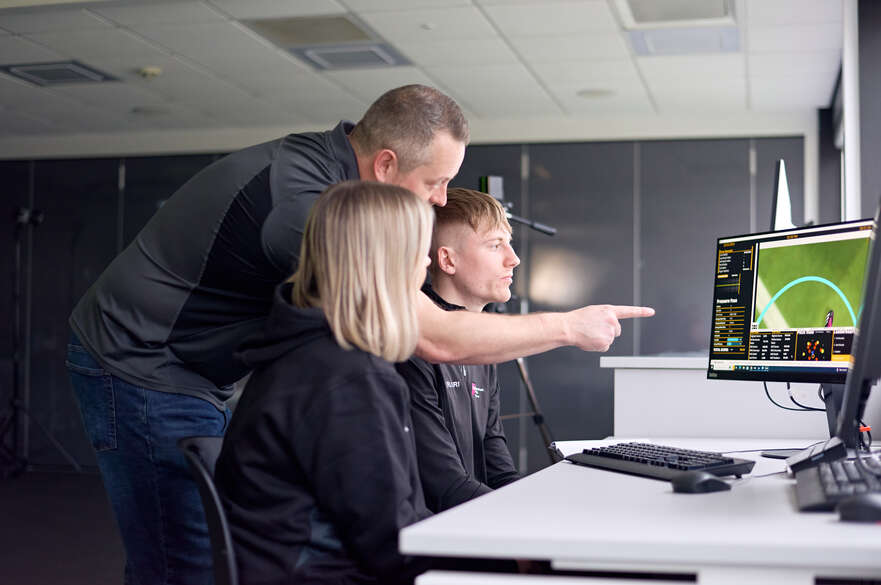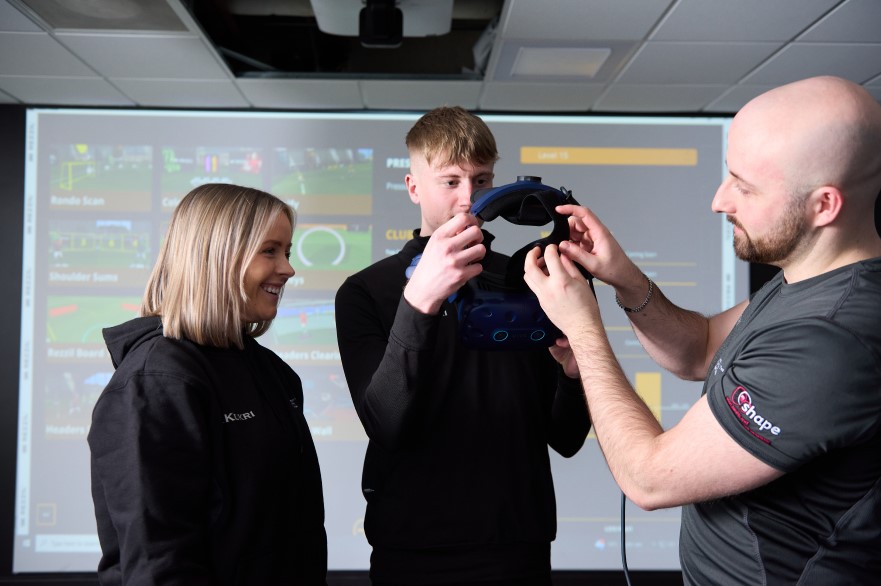Strength and Conditioning MSc
About this course
The MSc Strength and Conditioning course develops the theoretical knowledge and practical skills to enhance athletic performance and reduce injury risk. You’ll learn about the physiological and biomechanical adaptations that result from modern training methods and evaluate different models of periodisation and contemporary Strength and Conditioning practices. Additionally, you’ll learn how to create and implement tailored annual training plans and use monitoring and recovery tools to optimise performance and recovery.
This course will prepare you to support a broad spectrum of clients, from elite athletes to special populations such as older adults, youth, females, and athletes with disabilities. There is a rich, hands-on practical focus to this course supported by outstanding Strength and Conditioning facilities and resources.
This course will prepare students for professional accreditation with organizations such as the UK Strength and Conditioning Association (UKSCA) and the National Strength and Conditioning Association (NSCA). This ensures that when you graduate you are ready to meet the professional standards and excel in the evolving field of Strength and Conditioning.
This course is delivered by friendly and approachable student-centred staff who facilitate a supportive, interactive, and nurturing learning environment that will help you excel and achieve your academic goals.
Placement
There is an opportunity for a year-long placement, which is undertaken after the completion of the core modules. Upon completion of the placement, students will receive a Postgraduate Placement Diploma in Professional Practice.
Talk to us about Masters study
Meet us in-person or online to explore your postgraduate course in our Department of Sport Science.
Book a convenient appointment with a member of our Sport Science postgraduate team. We will link you with a member of staff who matches your course and career interests.
What you’ll study
You will study seven modules across areas including testing and monitoring, industry employability skills, special populations and data and research skills. Additionally, all students will have the opportunity to attend an Academic Language Skills programme.
Applied Principles of Strength and Conditioning (20 credit points)
This module offers an in-depth understanding of strength and conditioning programming, including exercise prescription and periodisation. There is emphasis on applying physiological and biomechanical principles to individualise training programs to enhance athletic performance.
Strength and Conditioning for Special Populations (20 cp)
This module develops the knowledge and skills required to design and evaluate Strength and Conditioning programmes that meet the unique demands of special populations, including older adults, youth, females, and athletes with disabilities. Students will learn how to adapt training methodologies based on physiological and biomechanical differences of special populations, whilst ensuring safety, effectiveness, and inclusivity.
Professional Placement in Strength and Conditioning (20 cp)
This module bridges academic learning with real-world application by providing vocationally relevant practical exposure in Strength and Conditioning. Students will develop professional skills, gain industry insights, and expand their professional network. This module enhances employability by fostering personal development and equipping students with the experience, skills, and connections that are essential for a successful career in Strength and Conditioning.
Testing, Monitoring and Programming for Strength and Conditioning (20 cp)
This module develops the knowledge and skills required for testing, monitoring, and programming for Strength and Conditioning in athletes. Focus is placed on assessing physical capabilities and developing evidence-based programmes to enhance athletic performance and reduce injury risk. Students will learn how to administer appropriate tests, integrate technology for continuous monitoring, and make real-time training adjustments. Emphasis is placed on creating periodised training programmes that are individualised and meet the demands of the sport.
Employability in Strength and Conditioning (20 cp)
This module develops essential and transferable employability skills, with a focus on adaptability, resilience, and identifying professional opportunities. Students will learn to formulate and execute career strategies, including financial management, marketing, legal considerations, and team leadership. Emphasis is placed on ethical principles, social responsibility, and continuous professional development to facilitate success in the Strength and Conditioning industry.
Practical Application of Research and Data (20 cp)
This module develops the knowledge and practical skills required for conducting Strength and Conditioning research and analysing and interpreting data. Focus is placed on research design (for field and lab-based work), data collection, statistical analysis, and interpretation.
Research Project (60 cp)
The research project is an independent piece of work, supervised and supported by a dedicated member of staff. Building on the knowledge and skills acquired throughout the course students will undertake a novel research project and produce an original research paper for a target scientific journal.
We regularly review and update our course content based on student and employer feedback, ensuring that all of our courses remain current and relevant. This may result in changes to module content or module availability in future years.
Don’t just take our word for it, hear from our students themselves
How you're taught
- Practical strength and conditioning workshops
- Group work
- Professional placement
- Lectures
- Seminars
Learn a new language
Alongside your study you also have the opportunity to learn a new language. The University Language Programme (ULP) is available to all students and gives you the option of learning a totally new language or improving the skills you already have. Find out more about the ULP.
Research informed teaching
By daring to think differently our research is tackling real-world issues. The subjects you will study with us are informed by our research so you can be sure your knowledge will be cutting-edge in your field. In the last Research Excellence Framework (REF 2021) - the UK's system for assessing the quality and impact of research in universities - we’re proud that 100% of NTU's Sport and Exercise Sciences, Leisure and Tourism submission was assessed to be world-leading or internationally excellent.
How you're assessed
Assessments for this course are 100% coursework and comprise the following types:
- Practical assessment
- Presentation
- Portfolio
- Viva
- Written report
Careers and employability
Graduates of the MSc Strength and Conditioning will be well equipped to work as a Strength and Conditioning specialist (employed and self-employed), sport scientist, or academic/teacher in the education sector. Opportunities will also exist across the health care sector and within sport organisations and clubs. This course can also provide a platform for students who want to gain further experience and relevant qualifications before committing to a research degree (i.e. PhD).
We will guide you on how to engage with employment opportunities across the wider university, as well as encouraging a welcoming community feel through course representatives, and enrichment week activities alongside other student support groups.
Re:search Re:imagined
To us, research is about more than writing papers and proposing new ideas. By daring to think differently, we’re disrupting the research landscape and finding the answers to the questions that really matter. From conservation management to sustainable farming, we’re inspiring the brightest minds to rise up and find solutions to some of the most significant global challenges facing society.
NTU Enterprise
You'll also have the opportunity to turn your ideas into a viable business with help from NTU Enterprise, NTU's purpose-built Centre for Entrepreneurship and Enterprise, a support centre to help students create, develop and grow their own businesses.
Campus and facilities
You’ll mainly be studying in the Erasmus Darwin and CELS Buildings with access to facilities including an environmental chamber, biomechanics lab, and nutrition suite.
Our self-contained, community-focused Clifton Campus has been designed to keep students busy between lectures. Catch-up with your course mates in the Pavilion’s barista café and Refectory; brainstorm group presentations in chic and stylish study spaces; enjoy some proper R&R in The Point, home of our Students’ Union. The campus also hosts the multimillion-pound Clifton Sports Hub, offering great options for everyone — whatever your interests, and however competitive you’d like to get!
Take a few steps off campus and you’ll find yourself in the heart of Nottingham — one of Britain’s top 10 student cities, and one of Europe’s top 25. As well as offering a great social scene, it’s one of the UK’s key sporting hubs, home to the iconic Trent Bridge Cricket Ground; Notts County (the world’s oldest professional football league club) and two-time European Cup-winners Nottingham Forest; the Nottingham Tennis Centre, the National Ice Centre, and the National Watersports Centre at Holme Pierrepont; plus rugby union, rugby league, hockey and ice hockey teams.
Entry requirements
UK students
- Honours degree (minimum 2.1 or equivalent) in a sport science related subject. Applicants with a 2.2 honours degree will be considered on an individual basis.
- Applicants with relevant employment experience or other relevant qualifications will also be considered.
Additional requirements for UK students
There are no additional requirements for this course.
Other qualifications and experience
We welcome applications from students with non-standard qualifications and learning backgrounds and work experience. We consider credit transfer, vocational and professional qualifications, and any work or life experience you may have.
You can view our Recognition of Prior Learning and Credit Transfer Policy which outlines the process and options available, such as recognising experiential learning and credit transfer.
Getting in touch
If you need more help or information, get in touch through our enquiry form.
International students
- Academic entry requirements: Honours degree (minimum 2.1 or equivalent) in a sport science related subject. Applicants with a 2.2 honours degree will be considered on an individual basis. Please check your international qualifications on our international entry requirements page.
- English language requirements: See our English language requirements page for requirements for your subject and information on alternative tests and Pre-sessional English.
Additional requirements for international students
There are no additional requirements for this course.
English language requirements
View our English language requirements for all courses, including alternative English language tests and country qualifications accepted by the University.
If you need help achieving the language requirements, we offer a Pre-Sessional English for Academic Purposes course on our City campus which is an intensive preparation course for academic study at NTU.
Other qualifications and experience
We welcome applications from students with non-standard qualifications and learning backgrounds and work experience. We consider credit transfer, vocational and professional qualifications, and any work or life experience you may have.
You can view our Recognition of Prior Learning and Credit Transfer Policy which outlines the process and options available, such as recognising experiential learning and credit transfer.
Sign up for emails
Sign up to receive regular emails from the International Office. You'll hear about our news, scholarships and any upcoming events in your country with our expert regional teams.
Getting in touch
If you need advice about studying at NTU as an international student or how to apply, our international webpages are a great place to start. If you have any questions about your study options, your international qualifications, experience, grades or other results, please get in touch through our enquiry form. Our international teams are highly experienced in answering queries from students all over the world.
Policies
We strive to make our admissions procedures as fair and clear as possible. To find out more about how we make offers, visit our admissions policies page.








